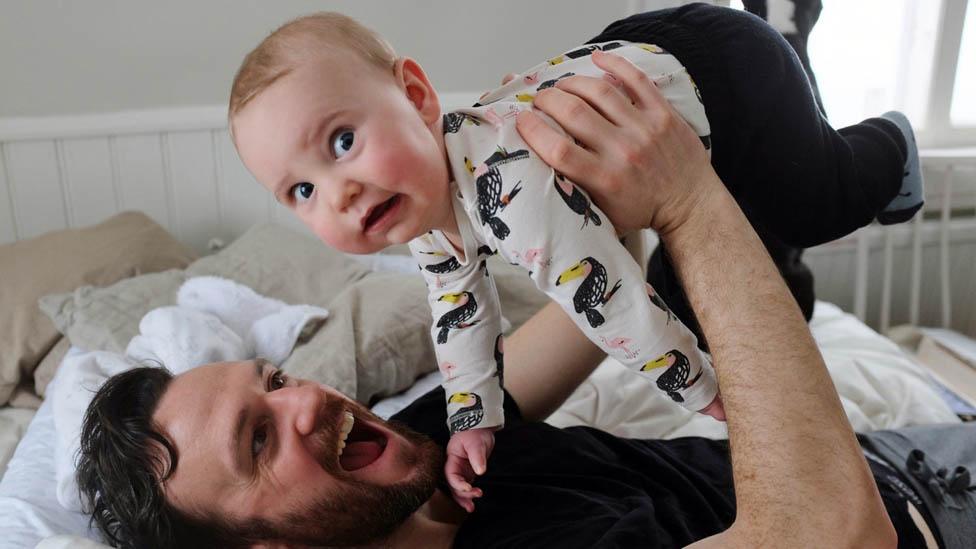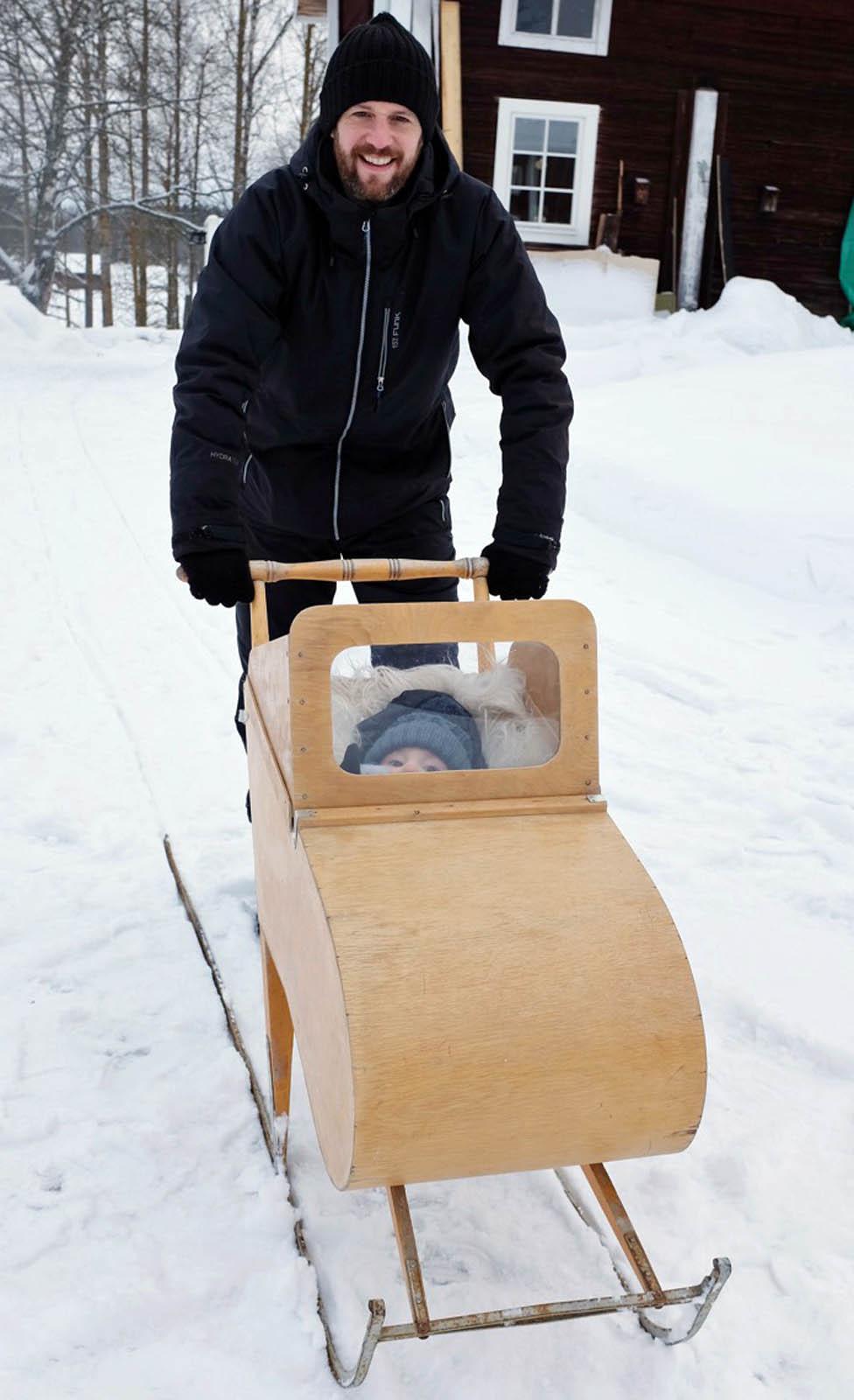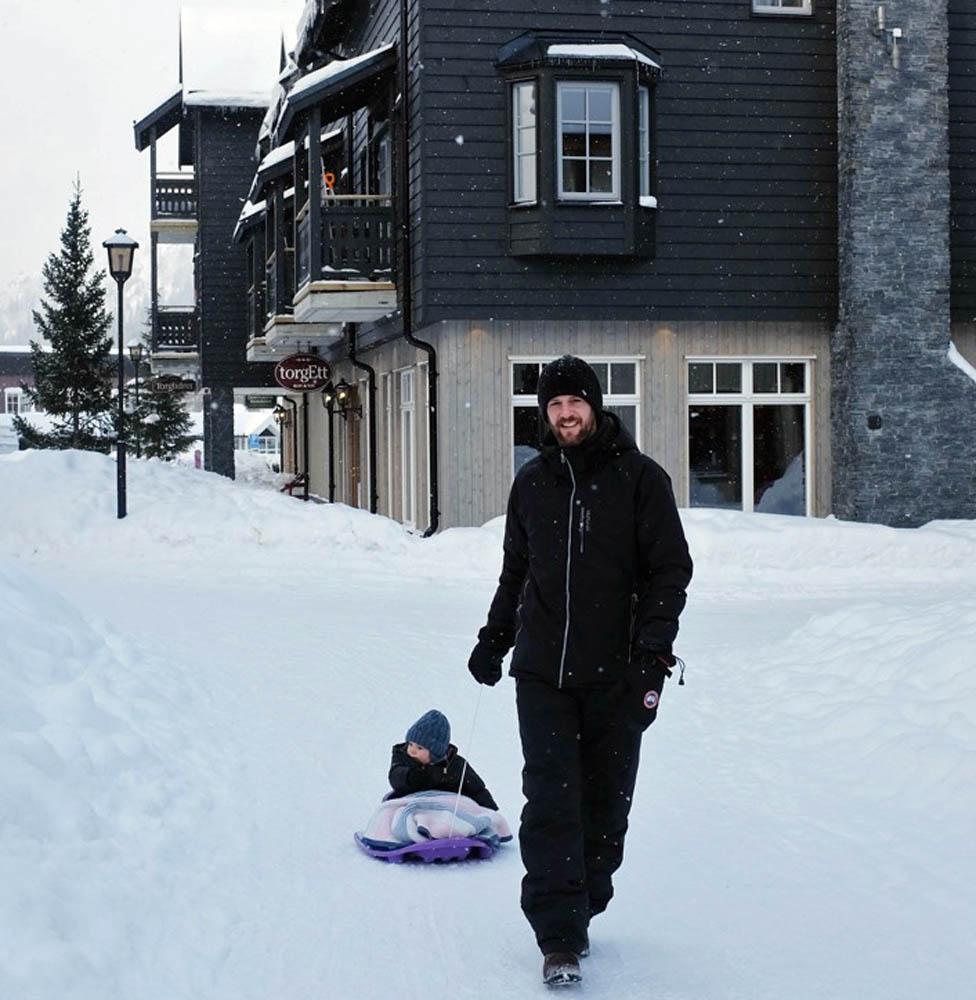'Am I OK with my son oinking in Swedish?'
- Published

Keith Moore is bringing up his Swedish-born son to be bilingual - but the language barrier in the farmyard is one he wasn't prepared for.
In times of triumph and tragedy it's always a good idea to turn to your oldest friends.
It was only right, then, that a couple of weeks after my first child was born I introduced him to someone who taught me a lot.
I'm talking about that jovial farmer who still resides in the back of my brain, Old MacDonald.
You know: "Old MacDonald had a farm, E-I-E-I-O." That Old MacDonald.
My son was born in Sweden. My wife is Swedish. I'm English. We want him to speak both languages.

Keith Moore with his wife Emmelie and their son
More than half of Europeans speak more than one language, and 90% of Swedes do - with English by far the most popular second language, external.
I'm still surprised sometimes when I switch on the TV at the range of British programmes broadcast here with subtitles, from Broadchurch and The Great British Bake Off to Emmerdale and the Antiques Roadshow.
Emmelie, my wife, is particularly keen for my son to speak English with an English accent - ideally like Oliver Twist transported to Stockholm. Oliver Twistsson, perhaps?

You may also like:

Of course, lots of people learn a second language as teenagers or adults. But many learn as babies too - either because the parents speak different languages or because they have moved to a country where the language is different.
Apparently, parents once feared that teaching a child two languages from birth would confuse them and stop them learning either language properly.
Nowadays, being bilingual is thought to have a lot of benefits.

Find out more
From Our Own Correspondent has insight and analysis from BBC journalists, correspondents and writers from around the world
Listen on iPlayer, get the podcast or listen on the BBC World Service, or on Radio 4 on Thursdays at 11:00 and Saturdays at 11:30 BST

There has been lots of research on this, showing that speaking several languages can improve your brain's plasticity, its ability to process new problems, and reduce the risks of dementia.
So, based on what we read and friends we spoke to, we opted for the one-parent-one-language approach. That means my wife speaks Swedish to our son and I speak English.
Which brings me back to Old MacDonald… and his Swedish cousin.
I was lazing on the sofa one Sunday in a new-baby haze, when I heard that familiar tune drifting in from the bedroom - but with different words.
"Per Olsson han hade en bonnagård, lian, lian, lej."
"Per Olsson? Huh," I thought to myself. "Not sure I'd trust him driving a tractor ahead of Old MacDonald."

But anyway, it continued and before long I heard the Swedish word for pig - "gris".
Followed by: "Med ett nöff-nöff här, och ett nöff-nöff där."
That's when I poked my head into the bedroom.
"A nöff-nöff?"
"Yes, a nöff-nöff," came the reply.
Are you sure you don't mean "oink, oink"?
"I'm sure."
"How about a dog?"
"Vov-vov."
And a horse?
"Gnägg-gnägg."
But they aren't the sounds they make, I said. A dog woofs and a horse neighs.
Apparently not to a Swede.

And not in lots of other languages, external either, I later learned. In fact, the words used to describe animal sounds varied far more, external than I could ever have imagined.
To a Japanese speaker, I read, the sound a bee makes is not "buzz buzz" but "boon boon".
When they're faced with questions like whether the pig in front of them "oink-oinks" or "nöff-nöffs", it seems less surprising that children brought up to be bilingual have superior problem-solving skills.
But on our first day trip to a farm, I think we will go easy on ourselves and take our son to visit a dairy farm.
Because for both Old MacDonald and Per Olsson, the cows go "moo". Well, the Swedish spell it "mu", but it's basically pronounced the same.
Join the conversation - find us on Facebook, external, Instagram, external, YouTube, external and Twitter, external.
